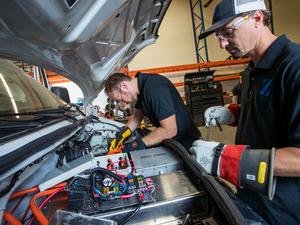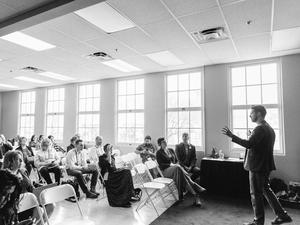Phoenix was once known as an agricultural haven for outputs like citrus and cotton, but nowadays the metro area is home to one of the largest tech talent pools in the country.
That’s according to the new 2021 Scoring Tech Talent report from CBRE that ranked Phoenix as the 17th best market for tech talent in North America, up one spot from its rank last year.
The report also found that Phoenix has the 14th largest tech talent pool nationally with just over 98,000 tech workers, a labor force that’s grown 14.2% from 2015.
The top region for overall tech talent in this year’s report was the San Francisco Bay Area, followed by Seattle and Washington, D.C. See a list of the top 20 below.
This is the ninth year of the Tech Talent report, which ranks the top 50 North American markets on their ability to attract and develop talent. The report specifically looks at 13 measures, including tech graduation rates, tech-job concentration, real estate costs and more.
The Covid-19 pandemic shuttered in-person events and forced essential employees to work in dangerous environments, but many tech workers were able to shift to remote work seamlessly. In fact, CBRE found that tech jobs grew by 0.8% nationally in 2020 as non-tech occupations declined by 5.5%.
Highly competitive
Kevin Calihan, a Phoenix-based executive vice president at CBRE, said that the tech industry is highly competitive since every city is working to build economies of the future.
“This is the most competitive space in employment likely in the country, right? Every city has a massive initiative to be better at tech,” he said in an interview. “So not only are we trying to jump those ahead of us, you have to fight hard to maintain your current position because it's competitive out there.”

As the familiar pitch goes, Arizona is attractive because of its weather, relatively cheap cost of living and its friendly business environment, all of which have helped the state grow in the past decade.
Even though apartment rents are likely to rise in Phoenix, these rates are still tolerable for tech workers in the region making an average salary exceeding $93,000, according to the report. And people moving from tier one tech markets like New York, Los Angeles or San Francisco would likely be happy to pay cheaper Phoenix rent prices, provided they can stand the summer heat.
Proximity to California is another important factor for the Phoenix metro, Calihan said. Little things like seeing Arizona State or University of Arizona sports teams across the field in the PAC-12 or winter vacations to Arizona breed a familiarity with the state that, for some, has led to permanent relocations.
Building an ecosystem
The Phoenix metro is undoubtedly a part of the tech conversation in America, but the centrality of its role in that conversation is still up for debate.
The Valley has long been home to established tech companies like Avnet, Insight, GoDaddy and scores of smaller companies have flocked here in recent years. Arizona, which has historically been defined by the real estate market, is also establishing itself as a semiconductor hub and a budding electric vehicle hub.
Calihan said the Phoenix metro is still dependent on relocations from California and elsewhere, so continuing to build the homegrown tech ecosystem in the Valley is essential.
“The ecosystem goes beyond just tech employees, it's all the people that support them,” he said. “It's the education, it’s companies that finance tech, it’s companies that fund them, it's people that give them advice.”
He said the tech ecosystem is already here, but continuing to foster that interconnected and collaborative web would help Phoenix move into the top of the rankings down the line.
Brain drain
One notable item from the report is that Phoenix experiences what CBRE calls a brain drain: The Valley notched 25,000 tech degree completions between 2016 and 2020, but only added 12,000 tech jobs in that time frame.
This drainage rate put Phoenix around the middle of CBRE’s findings, on par with cities like Atlanta and San Diego that also lost upwards of 15,000 tech graduates to other markets each year.
New York suffers the biggest brain drain, according to the report, losing more than 65,000 tech graduates each year, while Seattle gains about 29,000 per year and Toronto reels in more than 54,000 per year, the most on the report.
Southern connection
The CBRE report also ranks a secondary batch of 25 emerging tech markets and this year Tucson ranked No. 9. The home of UArizona and aerospace companies like Raytheon, Tucson previously ranked No. 1 on this list in 2019.
This year CBRE ranked Dayton, Ohio as the top up-and-coming tech city, followed by Huntsville, Alabama and Colorado Springs, Colorado.
Calihan said that even though Phoenix and Tucson are distinct markets, there is still a symbiotic relationship between the two; He said they’re more interrelated than competitive at this point as both cities are hoping to take off.
CBRE's Scoring Tech Talent 2021 - Top 20 markets
- San Francisco Bay Area
- Seattle
- Washington, D.C.
- Toronto
- New York metro
- Boston
- Austin
- Atlanta
- Los Angeles / Orange County
- Ottawa
- Vancouver
- Denver
- Dallas / Fort Worth
- Raleigh-Durham
- Baltimore
- Montreal
- Phoenix
- Salt Lake City
- San Diego
- Portland











